Key takeaways:
- The value of events lies in meaningful interactions that inspire and spark innovation, often transcending numerical measures.
- Networking is crucial in professional growth, with potential for mentorship and collaboration that can transform careers.
- Evaluating an event’s quality involves assessing speaker expertise, session relevance, and the diversity of attendee backgrounds.
- Setting personal networking goals enhances engagement and helps in building lasting relationships rather than mere transactional connections.
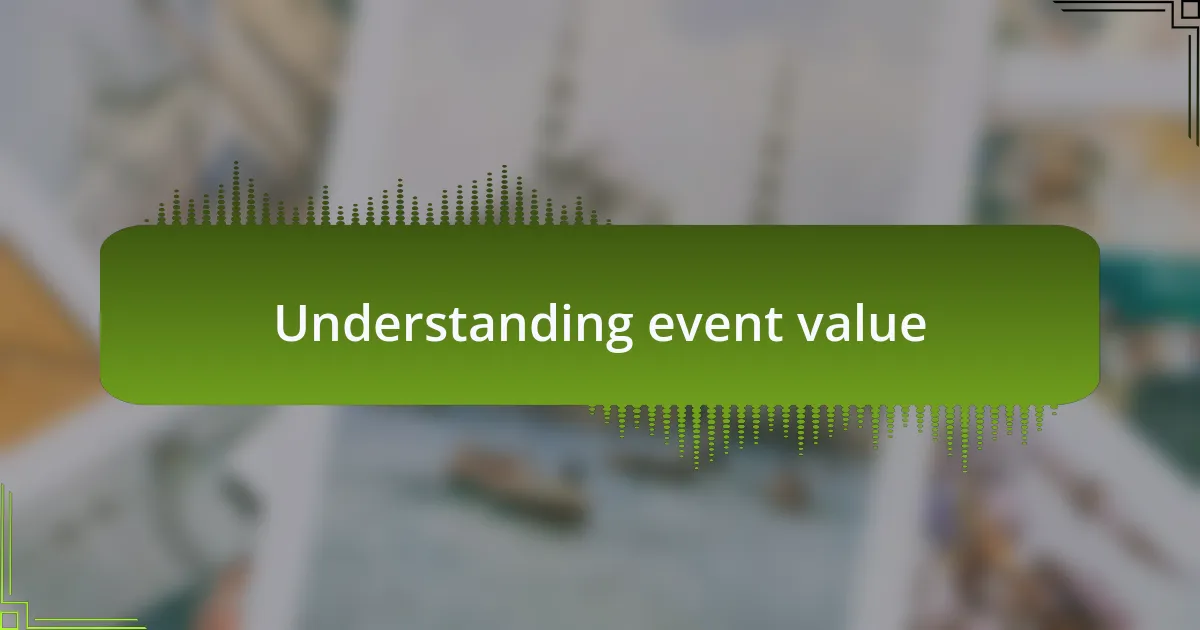
Understanding event value
When I think about the value of an event, I often reflect on those moments where insight and inspiration collided. I remember attending an industry expo where a single conversation changed my perspective entirely. How often do we underestimate the power of just one meaningful connection?
Understanding event value goes beyond numbers and statistics; it’s about the interactions that spark innovation. Have you ever left an event feeling more energized than when you arrived? That sense of motivation comes from engaging with others who share your passion, making the experience invaluable.
Value can also be found in the knowledge exchange during events. Reflecting on my experiences, I’ve learned that workshops and panel discussions often provide practical insights that aren’t available elsewhere. Isn’t it fascinating how much you can grow simply by listening to others’ experiences and wisdom?

Importance of networking
Networking holds immense significance, especially in the audiovisual industry. I can recall a particular event where I met someone who ultimately became my mentor. That relationship transformed my career, highlighting how a simple introduction can lead to opportunities you never imagined. Have you considered how many doors could open for you through just one connection?
Moreover, the emotional aspect of networking cannot be overlooked. Engaging with like-minded professionals creates a sense of community. I remember feeling an electrifying sense of belonging at an expo as I shared ideas with others who were just as passionate. It’s that camaraderie that fuels creativity and drives innovation.
In my experience, effective networking can also lead to collaboration on projects that elevate your work. There was a time when I partnered with new contacts I had met at an event, and together we produced a project that went beyond our individual capabilities. Isn’t it amazing how synergy between different talents can lead to something greater than anyone could achieve alone?
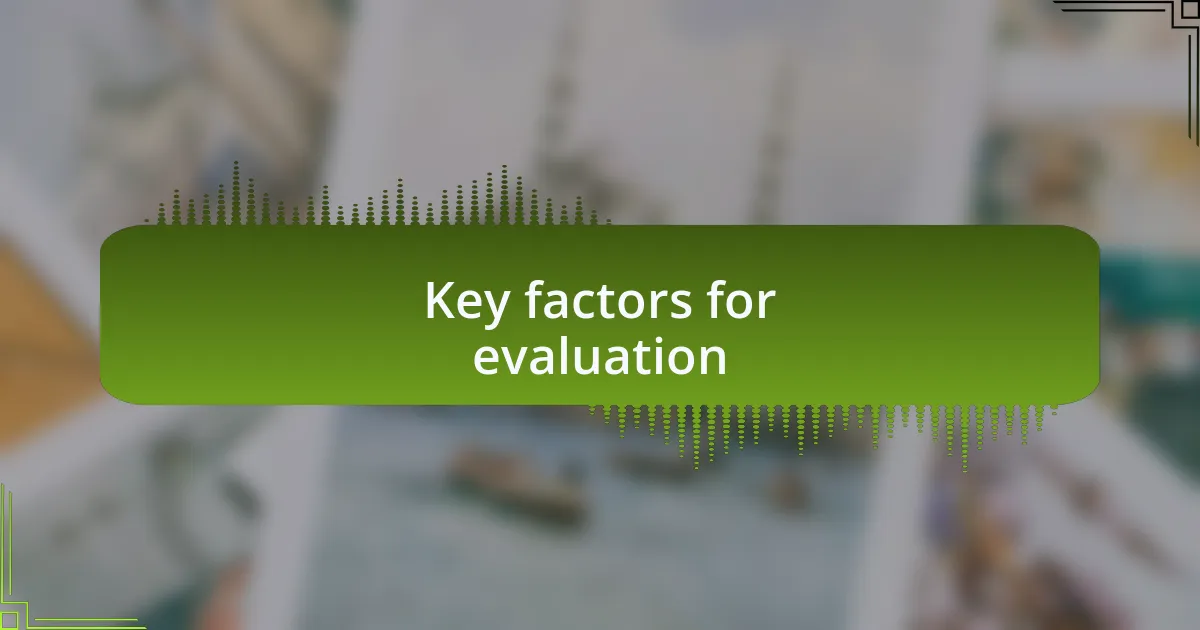
Key factors for evaluation
When evaluating the value of an event for networking, I focus on the attendees and their relevance to my goals. For instance, attending a smaller, specialized gathering often leads to deeper conversations and meaningful connections. Think about the last big event you went to—did you get lost in the crowd, or did you connect with key players in your field?
Another critical factor is the quality of the sessions or workshops offered. I remember participating in a hands-on workshop that not only expanded my knowledge but also facilitated connections with industry experts. Content that adds real value can be a game-changer. Have you ever walked away from a session feeling inspired and excited about potential collaborations?
Finally, location plays a crucial role in my evaluation. An event in a vibrant city can provide added opportunities for informal networking outside the main venue. During one expo, I found myself having a casual chat with a potential collaborator over coffee, which led to an innovative project. Can you think of a time when an unexpected meeting turned into something significant? Seeking these nuances makes all the difference in leveraging an event’s full potential.
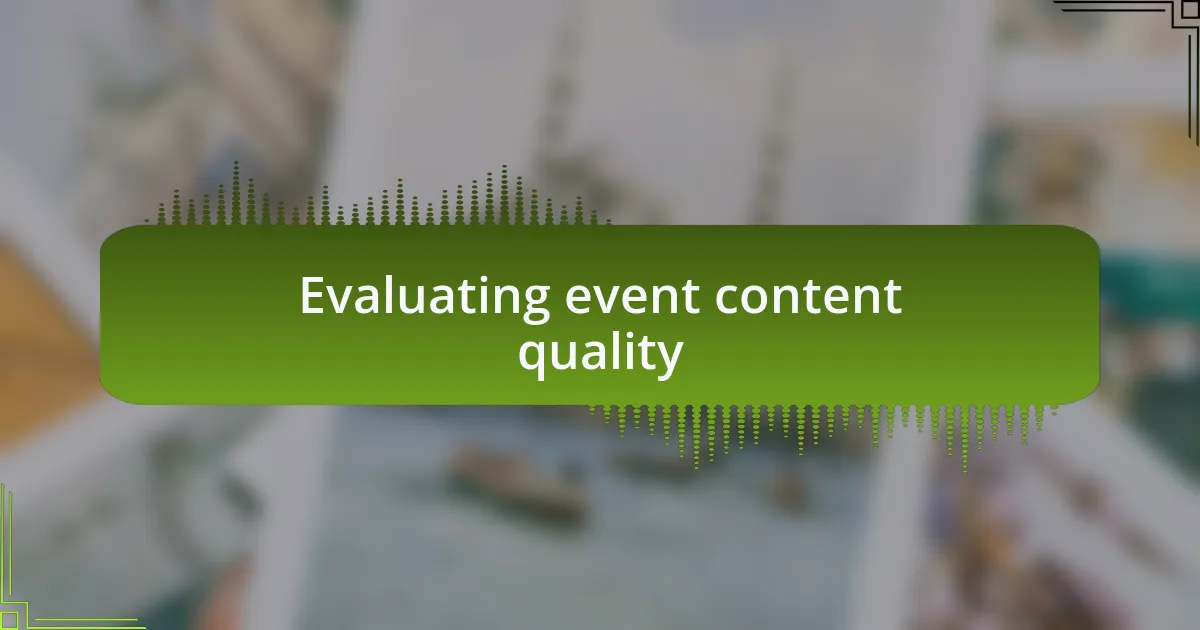
Evaluating event content quality
To evaluate event content quality, I look closely at the expertise of the speakers. For example, I once attended a conference where one speaker was a recognized leader in my field. Their session was packed with practical insights and real-world examples that I could immediately apply. Have you ever left a session feeling as though you’d just discovered a goldmine of information?
Another important aspect is the balance between theory and practical application. At one event, I encountered sessions that blended research with hands-on experiences, making the learning process feel alive and relevant. When I can engage with content that bridges the gap between concepts and implementation, I feel more motivated to connect with others who share that interest. Can you recall a time when a session genuinely resonated with you, prompting a follow-up conversation?
Lastly, I pay attention to the diversity of topics covered. Events that offer a range of subjects often attract a wider audience, leading to richer discussions. During one expo with varied themes, I found myself chatting with someone from an entirely different background, and it sparked new ideas I hadn’t considered before. Have you experienced those serendipitous moments that expand your perspective? It’s these elements that define the quality of event content for me.

Analyzing attendee demographics
Understanding attendee demographics is crucial for evaluating the overall value of networking at an event. When I analyze the mix of participants, I look for their professional roles, industries, and levels of experience. At a recent expo, I noticed a significant presence of young entrepreneurs eager to connect with seasoned professionals, creating a vibrant exchange of ideas. Have you ever felt the energy shift in a room when diverse perspectives come together?
Taking a closer look at the demographics also reveals trends in interest and engagement. For instance, during one conference, I found that a majority of attendees were from tech-related fields, which shaped the networking dynamics. This concentration encouraged deeper discussions about emerging technologies, sparking collaborations I didn’t anticipate. Think back to events where the crowd’s background influenced your conversations; didn’t it make for a more enriching experience?
Moreover, the geographic diversity of attendees can significantly impact networking opportunities. At an international event I attended last year, talking to participants from various countries brought invaluable insights into different market dynamics. Those discussions not only expanded my professional network but also enriched my understanding of global industry challenges. How often do we overlook the power of cultural perspectives in our field?
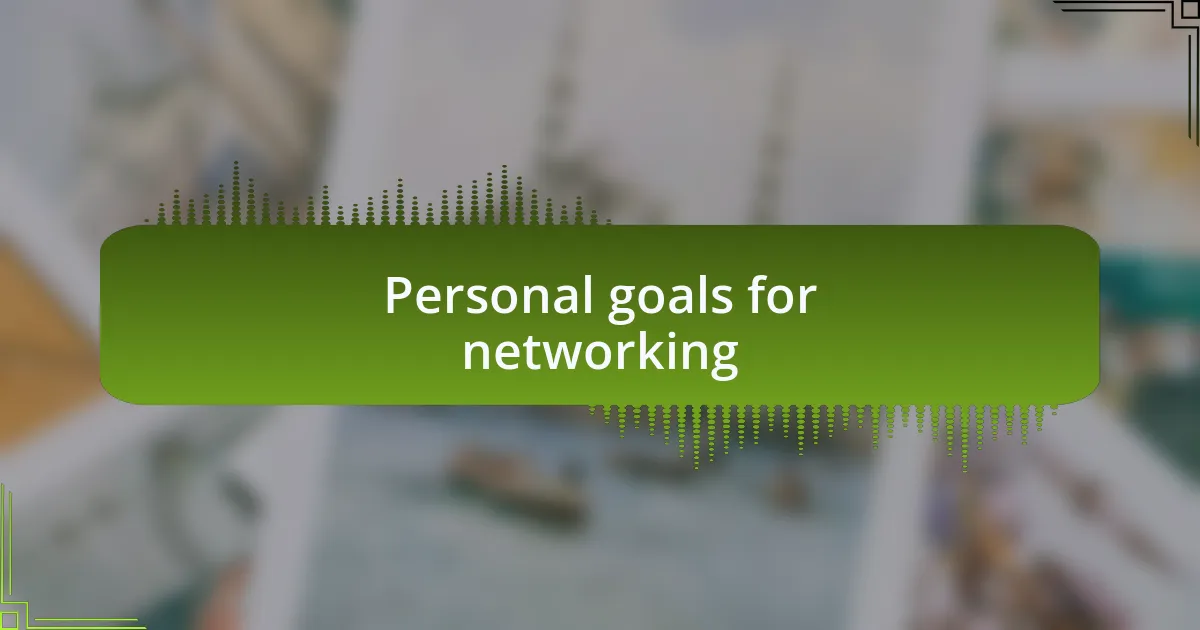
Personal goals for networking
Setting personal goals for networking is essential for maximizing the benefits of any event. For me, this often involves identifying key individuals I want to connect with before the expo even starts. I remember a time when I targeted a few industry leaders with whom I’d hoped to discuss innovative projects. Having clear goals made me more proactive in initiating conversations, and the connections I forged turned into mentorship opportunities that I truly value.
Another important aspect of my networking goals is to gather insights that will help me grow in my field. I’ve learned that entering a discussion with the intent to learn rather than just to pitch my ideas opens doors to more meaningful exchanges. At one event, I approached a panelist to ask about his approach to overcoming challenges. His perspective shifted my outlook and ultimately influenced a pivotal project I was working on. Have you ever found that the best lessons come from unexpected conversations?
Lastly, I aim to build lasting relationships rather than just transactional connections. I strive to follow up with new acquaintances and check in on them after the event. There was a time when I spent months nurturing a connection with someone I met at an expo, and eventually, we collaborated on a project that exceeded both our expectations. Isn’t it fascinating how a single conversation can blossom into a valuable partnership if we invest the time and effort?
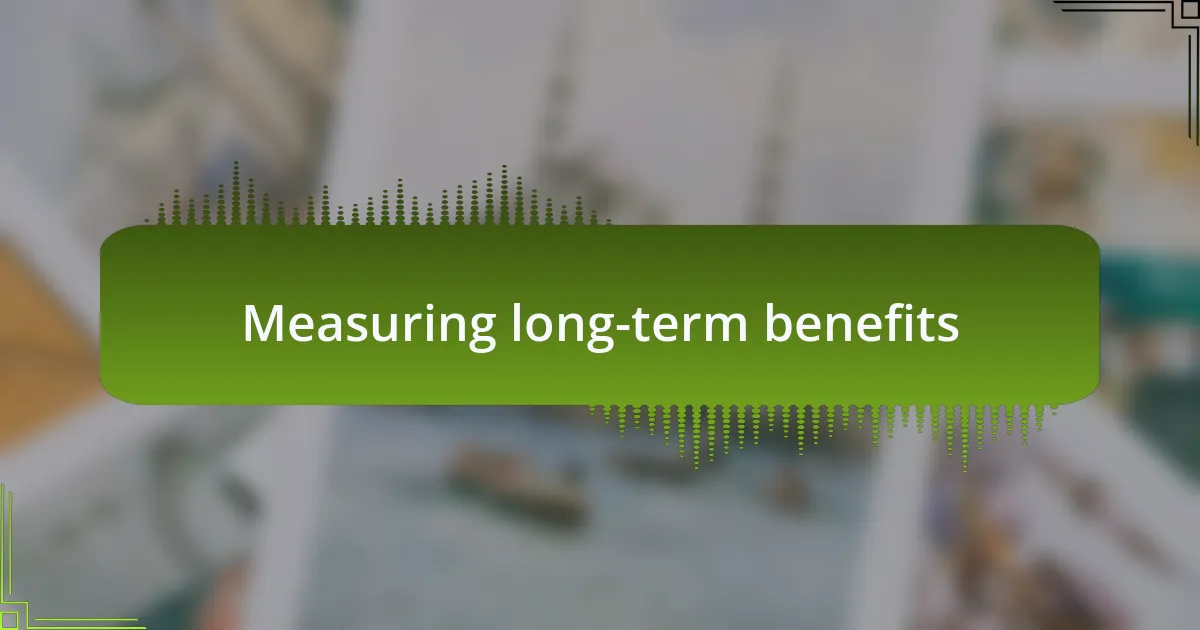
Measuring long-term benefits
Measuring long-term benefits involves evaluating how the connections made at an event evolve over time. I’ve often found it useful to keep track of interactions that lead to collaborative projects or referrals months down the line. For example, one connection I made resulted in a joint venture that opened new revenue streams—something that never would have happened without that initial conversation.
Another factor I consider is the impact of new ideas brought to the table. After attending a workshop at an expo, I integrated the strategies shared into my own work, leading to measurable improvements in efficiency. Have you experienced a moment where a single nugget of advice transformed your approach to a project?
Reflecting on how these relationships influence my career trajectory is crucial. I recall a mentor I met years ago at a conference who continues to guide my decisions today. The emotional support and professional guidance from such connections highlight the lasting value of investing in networking, even when the immediate benefits may not be apparent. Isn’t it remarkable how some connections stay with us far beyond a fleeting conversation?